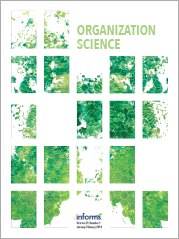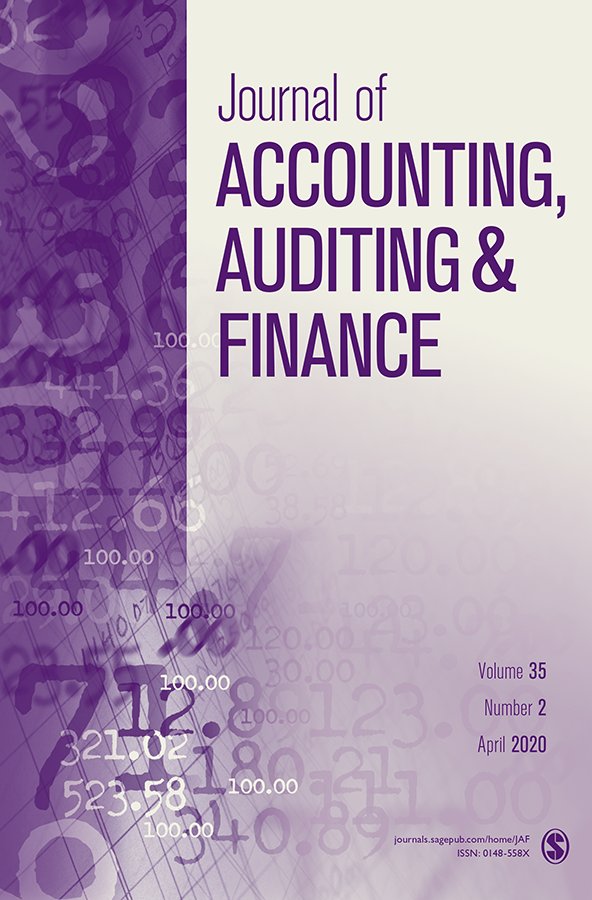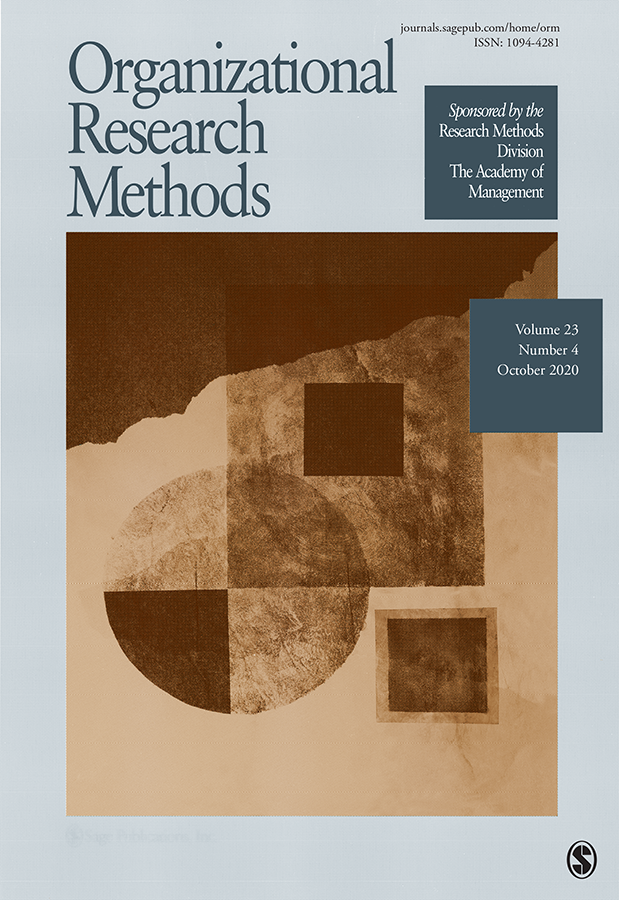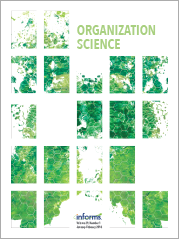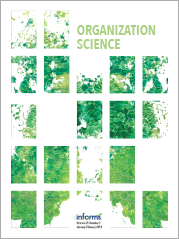Academic articles
Practitioner articles
Working papers
Books
Book chapters
Case studies
Other publications
Subject(s)
Diversity and inclusion; Strategy and general management
Keyword(s)
Chance models, adaptation, organizational learning, luck, situation, risk-taking
Chance models—mechanisms that explain empirical regularities through unsystematic variance—have a long tradition in the sciences but have been historically marginalized in management scholarship, relative to an agentic worldview about the role of managers and organizations. An exception is the work of James G. March and his coauthors, who proposed a variety of chance models that explain important management phenomena, including the careers of top executives, managerial risk taking, and organizational anarchy, learning, and adaptation. This paper serves as a tribute to the beauty of these “little ideas” and demonstrates how they can be recombined to generate novel implications. In particular, we focus on the example of an inverted V-shaped performance association centering around the year when executives were featured in a prominent listing, Barron’s annual list of Top 30 chief executive officers. Our extension of March and Shapira’s 1992 model provides a novel explanation for why many of the executives’ exceptional performances did not persist. In contrast to the common accounts of complacency, hubris, and statistical regression, the results show that declines from high performance may result from the way luck interacts with these executives’ slow adaptation, incompetence, and self-reinforced risk taking. We conclude by elaborating on the normative implications of chance models, which address many current management and societal challenges. We further encourage the continued development of chance models to help explain performance differences, shifting from accounts that favor heroic stories of corporate leaders toward accounts that favor their changing fortunes.
Copyright © 2021 Emerald Publishing Limited
Volume
76
Journal Pages
129–158
ISSN (Online)
978-1-78756-591-3
ISSN (Print)
978-1-78756-592-0
Subject(s)
Management sciences, decision sciences and quantitative methods; Strategy and general management
Keyword(s)
behavioral strategy, diversity, behavioral failures, strategic opportunities, CSRL limits to arbitrage
The persistent failure of organizations to engage diversity—to employ a diverse workforce and fully realize its potential—is puzzling, as it creates labor-market inefficiencies and untapped opportunities. Addressing this puzzle from a behavioral strategy as arbitrage perspective, this paper argues that attractive opportunities tend to be protected by strong behavioral and social limits to arbitrage. I outline four limits—cognizing, searching, reconfiguring, and legitimizing (CSRL)—that deter firms from sensing, seizing, integrating and justifying valuable diversity. The case of Moneyball is used to illustrate how these CSRL limits prevented mispriced human resources from being arbitraged away sooner, with implications for engaging cognitive diversity that go beyond sports. This perspective describes why behavioral failures as arbitrage opportunities can persist and prescribes strategists, as contrarian theorists, a framework for formulating relevant behavioral and social problems to solve in order to search for and exploit these untapped opportunities.
Copyright © 2021, The Author
Volume
32
Journal Pages
1193–1209
Subject(s)
Human resources management/organizational behavior
Keyword(s)
Career shocks, executives, executive coaching
This paper is a qualitative exploration of managers’ career shock experiences reflected in executive coaching interventions. It takes an anecdotal look at how executives react to shocks of various valences, and how coaching attempts to assist them by processing their first reactions and choosing a response. The paper particularly looks at managers’ responses almost immediately following a shocking event triggering their request for coaching help.
Volume
26
Journal Pages
582–595
Subject(s)
Finance, accounting and corporate governance
Keyword(s)
Analyst forecast, earnings announcement, investor sophistication, under-reaction
We decompose analysts’ earnings forecast error into predictable and unpredictable components, and investigate individual vis-à-vis institutional investors’ reactions to each of these components. We find that in the immediate post-earnings announcement window, only individuals under-react to the predictable component, while both individuals and institutions under-react to the unpredictable component. The price drift in this window is driven primarily by investors’ under-reaction to the unpredictable component. This drift remains highly significant in larger firms and intensifies in firms with complex financial reports, suggesting that it likely represents the slow and noisy process of price discovery. Around the next quarterly earnings announcement, only individuals under-react to the previous quarter’s predictable component, and this fixation drives the entire price drift in this window. This drift disappears in larger firms, and gets exacerbated in firms with greater forecast error autocorrelations, suggesting that it is likely attributable to incomplete processing of earnings information by individuals.
With permission of SAGE Publishing
Volume
36
Journal Pages
826–853
ISSN (Online)
2160-4061
Subject(s)
Management sciences, decision sciences and quantitative methods
Keyword(s)
Social network analysis, network dynamics, Relational Events Model
The Relational Event Model (REM) solves a problem for organizational researchers who have access to sequences of time stamped interactions. It enables them to estimate statistical models without collapsing the data into cross-sectional panels, which removes timing and sequence information. However, there is little guidance in the extant literature regarding issues that may affect REM’s power, precision and accuracy: How many events or actors are needed? How large should the risk set be? How should statistics be scaled? To gain insights into these issues, we conduct a series of experiments using simulated sequences of relational events under different conditions and using different sampling and scaling strategies. We also provide an empirical example using email communications in a real-life context. Our results indicate that, in most cases, the power and precision levels of REMs are good, making it a strong explanatory model. However, REM suffers from issues of accuracy that can be severe in certain cases, making it a poor predictive model. We provide a set of practical recommendations to guide researcher’s use of REMs in organizational research.
With permission of SAGE Publishing
Volume
24
Journal Pages
802–829
Keyword(s)
Price competition, price dispersion, unique equilibrium
JEL Code(s)
D43, L11
We study a canonical model of simultaneous price competition between firms that sell a homogeneous good to consumers who are characterized by the number of prices they are exogenously aware of. Our setting subsumes many employed in the literature over the last several decades. We show there is a unique equilibrium if and only if there exist some consumers who are aware of exactly two prices. The equilibrium we derive is in symmetric mixed strategies. Furthermore, when there are no consumers aware of exactly two prices, we show there is an uncountable-infinity of asymmetric equilibria in addition to the symmetric equilibrium. Our results show the paradigm generically produces a unique equilibrium. We also show that the commonly-sought symmetric equilibrium (which also nests the textbookBertrand pure strategy equilibrium as a special case) is robust to perturbations in consumer behaviour, while the asymmetric equilibria are not.
© 2021 The Editorial Board of The Journal of Industrial Economics and John Wiley & Sons Ltd.
Volume
69
Journal Pages
595–614
Subject(s)
Economics, politics and business environment; Information technology and systems
Keyword(s)
online markets, price comparison websites, price dispersion, price competition, platforms, consumer search, consumer welfare
JEL Code(s)
L11, L86, D43
The large and growing industry of price comparison websites (PCWs) or “web aggregators” is poised to benefit consumers by increasing competitive pricing pressure on firms by acquainting shoppers with more prices. However, these sites also charge firms for sales, which feeds back to raise prices. I find that introducing any number of PCWs to a market increases prices for all consumers, both those who use the sites, and those who do not. I then use my framework to identify ways in which a more competitive environment could be achieved.
Volume
62
Journal Pages
1081–1110
ISSN (Online)
1468-2354
Subject(s)
Technology, R&D management
Keyword(s)
Selection, novelty, decision-making, innovation, panel
We examine how groups fall prey to the sequence effect when they make choices based on informed assessments of complex situations, for example, when evaluating research and development (R&D) projects. The core argument is that the temporal sequence of selection matters because projects that appear in a sequence following a funded project are themselves less likely to receive funding. Building on the idea that selecting R&D projects is a demanding process that drains participants’ mental and emotional resources, we further theorize the moderating effect of the influence of the timing of the panel meeting on the sequence effect. We test these conjectures using a randomization in sequence order from several rounds of R&D project selection at a leading professional service firm. We find robust support for the existence of a sequence effect in R&D as well as for the moderating effect. We further explore different explanations for the sequence effect and how it passes from the individual to the panel. These findings have broader implications for the literature on innovation and search in general and on group decision making for R&D, specifically, as they suggest that a previously overlooked dimension affects selection outcomes.
Copyright © 2021, The Author(s)
Volume
32
Journal Pages
987–1008
Subject(s)
Management sciences, decision sciences and quantitative methods; Strategy and general management
Keyword(s)
Reinforcing processes, quality, performance evaluation, movie industry, luck
When does market success indicate superior merit? We show that when consumer choices between products with equal prices depend on quality but also on past popularity, more popular products are not necessarily of higher quality. Rather, a medium level of popularity may be associated with lower quality than lower levels of popularity. Using a formal model we show that this kind of non-monotonic association occurs when reinforcing processes are strong. More generally, a dip can occur when outcomes depend on both quality and resources and the latter are allocated bimodally, with some being given a lot of resources and most receiving little. Empirically, we illustrate that such a dip occurs in the association between movie theater sales and ratings. The presence of a dip in the outcome-quality association complicates learning from market outcomes and evaluation of individuals and new ventures, challenges the legitimacy of stratification systems, and creates opportunities for sophisticated evaluators who understand the dip.
Copyright © 2021, The Author(s)
Volume
32
Journal Pages
1079–1099
Subject(s)
Economics, politics and business environment
Keyword(s)
Cartels, private damages, competition law
Private cartel damages litigation is on the rise in Europe since early 2000. This development has been initiated by the European courts and was supported by various policy initiatives of the European Commission, which found its culmination in the implementation of the EU Directive on Antitrust Damages end of 2016. This paper explores the impact of this reform process on effective compensation of damaged parties of cartel infringements. For that purpose we analyse all European cartel cases with a decision date between 2001 and 2015, for which we analyse litigation activity and speed. Overall, we find a substantial reduction of the time until first settlement (increase in litigation speed) together with a persisting high share of cases being litigated (high litigation activity). This supports the view that the reform not only increased the claimant’s expectation about the amount of damages being awarded, but also resulted in an alignment in the expectations of claimants and defendants in the final damages amount, i.e. the European Commission succeeded in reaching its objective to clarify and harmonize legal concepts across Europe.
Volume
9
Journal Pages
313–346

